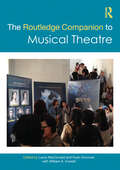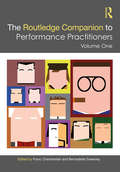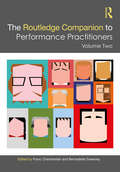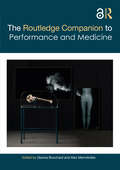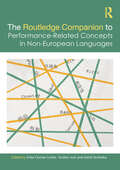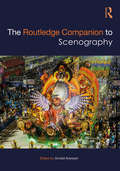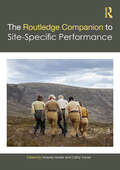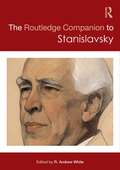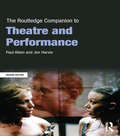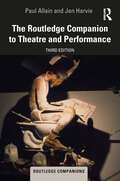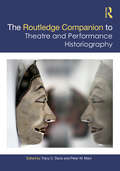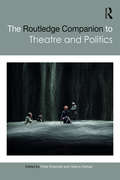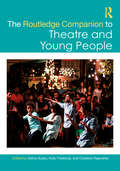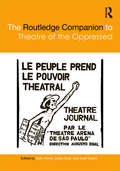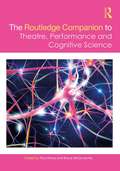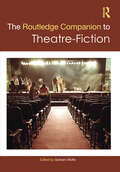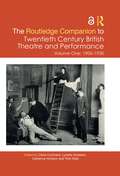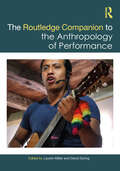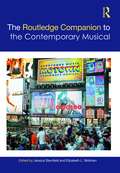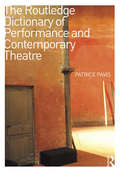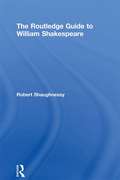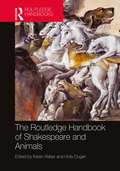- Table View
- List View
The Routledge Companion to Musical Theatre (Routledge Companions)
by William A. Everett Laura MacDonald Ryan DonovanGlobal in scope and featuring thirty-five chapters from more than fifty dance, music, and theatre scholars and practitioners, The Routledge Companion to Musical Theatre introduces the fundamentals of musical theatre studies and highlights developing global trends in practice and scholarship. Investigating the who, what, when, where, why, and how of transnational musical theatre, The Routledge Companion to Musical Theatre is a comprehensive guide for those studying the components of musical theatre, its history, practitioners, audiences, and agendas. The Companion expands the study of musical theatre to include the ways we practice and experience musicals, their engagement with technology, and their navigation of international commercial marketplaces. The Companion is the first collection to include global musical theatre in each chapter, reflecting the musical’s status as the world’s most popular theatrical form. This book brings together practice and scholarship, featuring essays by leading and emerging scholars alongside luminaries such as Chinese musical theatre composer San Bao, Tony Award-winning star André De Shields, and Tony Award-winning director Diane Paulus. This is an essential resource for students on theatre and performance courses and an invaluable text for researchers and practitioners in these areas of study.
The Routledge Companion to Performance Practitioners: Volume One (Routledge Companions)
by Franc Chamberlain; Bernadette SweeneyThe Routledge Companion to Performance Practitioners collects the outstanding biographical and production overviews of key theatre practitioners first featured in the popular Routledge Performance Practitioners series of guidebooks. Each of the chapters is written by an expert on a particular figure, from Stanislavsky and Brecht to Laban and Decroux, and places their work in its social and historical context. Summaries and analyses of their key productions indicate how each practitioner's theoretical approaches to performance and the performer were manifested in practice. All 22 practitioners from the original series are represented, with this volume covering those born before the end of the First World War. This is the definitive first step for students, scholars and practitioners hoping to acquaint themselves with the leading names in performance, or deepen their knowledge of these seminal figures.
The Routledge Companion to Performance Practitioners: Volume Two (Routledge Companions)
by Franc Chamberlain; Bernadette SweeneyThe Routledge Companion to Performance Practitioners collects the outstanding biographical and production overviews of key theatre practitioners first featured in the popular Routledge Performance Practitioners series of guidebooks. Each of the chapters is written by an expert on a particular figure, from Stanislavsky and Brecht to Laban and Decroux, and places their work in its social and historical context. Summaries and analyses of their key productions indicate how each practitioner's theoretical approaches to performance and the performer were manifested in practice. All 22 practitioners from the original series are represented, with this volume covering those born after 1915. This is the definitive first step for students, scholars and practitioners hoping to acquaint themselves with the leading names in performance, or deepen their knowledge of these seminal figures.
The Routledge Companion to Performance and Medicine (Routledge Companions)
by Alex Mermikides Gianna BouchardThe Routledge Companion to Performance and Medicine addresses the proliferation of practices that bridge performance and medicine in the contemporary moment.The scope of this book's broad range of chapters includes medicine and illness as the subject of drama and plays; the performativity of illness and the medical encounter; the roles and choreographies of the clinic; the use of theatrical techniques, such as simulation and role-play, in medical training; and modes of performance engaged in public health campaigns, health education projects and health-related activism. The book encompasses some of these diverse practices and discourses that emerge at the interface between medicine and performance, with a particular emphasis on practices of performance.This collection is a vital reference resource for scholars of contemporary performance; medical humanities; and the variety of interdisciplinary fields and debates around performance, medicine, health and their overlapping collaborations.Chapter 18 of this book is freely available as a downloadable Open Access PDF at http://www.taylorfrancis.com under a Creative Commons Attribution CC-BY 4.0 license.
The Routledge Companion to Performance-Related Concepts in Non-European Languages (ISSN)
by Erika Fischer-Lichte Torsten Jost Astrid SchenkaInvestigating more than 70 key concepts relating to the performing arts in more than six non-European languages, this volume provides a groundbreaking research tool and one-of-a-kind reference source for theatre, performance and dance studies worldwide.The Companion features in-depth explorations of and expert introductions to a select number of performance-related key concepts in Arabic, Chinese, Japanese, Korean, Yorùbá as well as the Indian languages Sanskrit, Hindi and Tamil. Key concepts—such as Furǧa فرجة in Arabic, for example, or Jiadingxing 假定性 in Chinese, Gei 芸 in Japanese, Ìparadà in Yorùbá and Imyeon 이면 in Korean—that defy easy translation from one language to another (and especially into English as the world’s lingua franca) and that reflect culturally specific ways of thinking and talking about the performing arts are thoroughly examined in in-depth articles. Written by more than 60 distinguished scholars from around the globe, the articles describe in detail each concept’s dynamic history, its flexible scope of meaning and current range of usage. The Companion also includes extensive introductions to each language section, in which internationally renowned experts explain how the presented key concepts are situated within, and are constitutive of, distinct and dynamic epistemic systems that have different yet always interlinked histories and orientations. Offers a fascinating insight into the unique histories, characteristics, and orientations of linguistically and culturally distinct epistemic systems related to the performative arts Contains extensive cross-references and bibliographies An invaluable research tool and one-of-a-kind reference source for scholars and students worldwide and across the humanities, especially in the fields of theatre, performance, dance, translation, area and cultural studies An accessible handbook for everybody interested in performance cultures and performance-related knowledge systems existing in the world today. This volume provides an invaluable research tool and one-of-a-kind reference source for scholars and students worldwide and across the humanities, especially in the fields of theatre, performance, dance, translation and area studies, history (of science and the humanities) and cultural studies.
The Routledge Companion to Scenography (Routledge Companions)
by Arnold AronsonThe Routledge Companion to Scenography is the largest and most comprehensive collection of original essays to survey the historical, conceptual, critical and theoretical aspects of this increasingly important aspect of theatre and performance studies. Editor and leading scholar Arnold Aronson brings together a uniquely valuable anthology of texts especially commissioned from across the discipline of theatre and performance studies. Establishing a stable terminology for a deeply contested term for the first time, this volume looks at scenography as the totality of all the visual, spatial and sensory aspects of performance. Tracing a line from Aristotle’s Poetics down to Brecht and Artaud and into contemporary immersive theatre and digital media, The Routledge Companion to Scenography is a vital addition to every theatre library.
The Routledge Companion to Site-Specific Performance (Routledge Companions)
by Victoria Hunter Cathy TurnerThis collection comprises a comprehensive overview of key themes, arguments, and practices central to the study and understanding of site-specific performance.Its collected essays, case studies, and practitioner accounts represent a must-have resource that engages with established and emergent ideas, themes, and practices central to this performance sub-discipline. Acknowledging the interdisciplinary nature of this field emergent through the creation and presentation of performance in non-theatre spaces, the companion includes writing from scholars whose work intersects with ideas from a range of related fields including dance, theatre, dramaturgy, human geography, architecture, walking studies, and archaeology. Alongside theoretical discussions and case study examples, a section on methods and structures allows site-specific practitioners to illustrate a range of practical approaches, tasks, and modes of producing site-specific performance in a range of sites.This interdisciplinary survey brings together practices and voices from a wide range of global contexts, demonstrating and challenging the breadth of site-specific discourse. It provides a rich palette of perspectives, approaches, and ideas for students, academics, and researchers to draw from.
The Routledge Companion to Stanislavsky (Routledge Companions Ser.)
by R. Andrew WhiteStanislavsky’s system of actor-training has revolutionised modern theatre practice, and he is widely recognised to be one of the great cultural innovators of the twentieth century. The Routledge Companion to Stanislavsky is an essential book for students and scholars alike, providing the first overview of the field for the 21st century. An important feature of this book is the balance between Stanislavsky’s theory and practice, as international contributors present scholarly and artistic interpretations of his work. With chapters including academic essays and personal narratives, the Companion is divided into four clear parts, exploring Stanislavsky on stage, as an acting teacher, as a theorist and finally as a theatre practitioner. Bringing together a dazzling selection of original scholarship, notable contributions include:Anatoly Smeliansky on Stanislavsky’s lettersWilliam D. Gunn on staging ideology at the Moscow Art TheatreSharon Marie Carnicke and David Rosen on opera Rosemary Malague on the feminist perspective of new translationsW.B. Worthen on cognitive scienceJulia Listengarten on the avant-gardeDavid Krasner on the System in America and Dennis Beck on Stanislavsky’s legacy in non-realistic theatre R. Andrew White is Associate Professor of Theatre at Valparaiso University, where he annually directs productions. He has an MFA in Acting from Carnegie Mellon University and the Moscow Art Theatre School, and has worked as an actor at a variety of theatres in the United States. In addition, his scholarship has appeared in edited works published by Routledge and Palgrave Macmillan, as well as in top American journals including Theatre Survey, TDR/The Drama Review, and New England Theatre Journal.
The Routledge Companion to Studio Performance Practice
by Franc ChamberlainThe Routledge Companion to Studio Performance Practice is a unique, indispensable guide to the training methods of the world’s key theatre practitioners. Compiling the practical work outlined in the popular Routledge Performance Practitioners series of guidebooks, each set of exercises has been edited and contextualised by an expert in that particular approach. Each chapter provides a taster of one practitioner’s work, answering the same key questions: ‘How did this artist work? How can I begin to put my understanding of this to practical use?’ Newly written chapter introductions put the exercises in context, explaining how they fit into the wider methods and philosophy of the practitioner in question. All 21 volumes in the original series are represented in this volume.
The Routledge Companion to Theatre and Performance (Routledge Companions)
by Paul Allain Jen HarvieWhat is theatre? What is performance? What connects them and how are they different? What events, people, practices and ideas have shaped theatre and performance in the twentieth and twenty-first century? The Routledge Companion to Theatre and Performance offers some answers to these big questions. It provides an analytical, informative and engaging introduction to important people, companies, events, concepts and practices that have defined the complementary fields of theatre and performance studies. This fully updated second edition contains three easy to use alphabetized sections including over 120 revised entries on topics and people ranging from performance artist Ron Athey, to directors Vsevold Meyerhold and Robert Wilson, megamusicals , postdramatic theatre and documentation. Each entry includes crucial historical and contextual information, extensive cross-referencing, detailed analysis and an annotated bibliography. The Routledge Companion to Theatre and Performance is a perfect reference guide for the keen student.
The Routledge Companion to Theatre and Performance (Routledge Companions)
by Paul Allain Jen HarvieWhat is theatre? What is performance? What connects them and how are they different? How have they been shaped by events, people, companies, practices and ideas in the twentieth and twenty-first centuries? And where are they heading next? The Routledge Companion to Theatre and Performance offers some answers to these big questions. This third edition has been updated to now include over 160 entries, with all entries brought up to date and new topics added, including Caryl Churchill, Black Lives Matter and Hamilton, among others.This book provides an accessible, informative and engaging introduction to important people and companies, events, concepts and practices that have defined the complementary fields of theatre and performance studies. Three easy-to-use alphabetized sections include entries on topics and people ranging from performance artists Marina Abramović and Pope.L to directors Vsevolod Meyerhold and Robert Wilson, the haka, Taking the Knee and disability, theatre and performance. Each entry includes important historical and contextual information, extensive cross-referencing, detailed analysis and an annotated bibliography.The Routledge Companion to Theatre and Performance is a perfect reference guide for the keen student and the passionate theatre-goer alike.
The Routledge Companion to Theatre and Performance Historiography (Routledge Companions)
by Tracy C. DavisThe Routledge Companion to Theatre and Performance Historiography sets the agenda for inclusive and wide-ranging approaches to writing history, embracing the diverse perspectives of the twenty-first century and Critical Media History. Written by an international team of authors whose expertise spans a multitude of historical periods and cultures, this collection of fascinating essays poses the central question: "what is specific to the historiography of the performative?" The study of theatre, in conjunction with the wider sphere of performance, involves an array of multi-faceted methods for collecting evidence, interpreting sources, and creating meaning. Reflecting on issues of recording — from early modern musical scores, through VHS-technology to latest digital procedures — and on what is missing from records or oblique in practices, the contributors convey how theatre and performance history is integral to social and cultural relations. This expertly curated collection repositions theatre and performance history and is essential reading for Theatre and Performance Studies students or those interested in social and cultural history more generally.
The Routledge Companion to Theatre and Politics (Routledge Companions)
by Peter Eckersall Helena GrehanThe Routledge Companion to Theatre and Politics is a volume of critical essays, provocations, and interventions on the most important questions faced by today’s writers, critics, audiences, and theatre and performance makers. Featuring texts written by scholars and artists who are diversely situated (geographically, culturally, politically, and institutionally), its multiple perspectives broadly address the question "How can we be political now?" To respond to this question, Peter Eckersall and Helena Grehan have created eight galvanising themes as frameworks or rubrics to rethink the critical, creative, and activist perspectives on questions of politics and theatre. Each theme is linked to a set of guiding keywords: Post (post consensus, post-Brexit, post-Fukushima, post-neoliberalism, post-humanism, post-global financial crisis, post-acting, the real) Assembly (assemblage, disappearance, permission, community, citizen, protest, refugee) Gap (who is in and out, what can be seen/heard/funded/allowed) Institution (visibility/darkness, inclusion, rules) Machine (biodata, surveillance economy, mediatisation) Message (performance and conviction, didacticism, propaganda) End (suffering, stasis, collapse, entropy) Re. (reset, rescale, reanimate, reimagine, replay: how to bring complexity back into the public arena, how art can help to do this). These themes were developed in conversation with key thinkers and artists in the field, and the resulting texts engage with artistic works across a range of modes including traditional theatre, contemporary performance, public protest events, activism, and community and participatory theatre. Suitable for academics, performance makers, and students, The Routledge Companion to Theatre and Politics explores questions of how to be political in the early 21st century, by exploring how theatre and performance might provoke, unsettle, reinforce, or productively destabilise the status quo.
The Routledge Companion to Theatre and Young People (Routledge Companions)
by Kelly Freebody Charlene Rajendran Selina BusbyThis companion interrogates the relationship between theatre and youth from a global perspective, taking in performances and theatre made by, for, and about young people. These different but interrelated forms of theatre are addressed through four critical themes that underpin the ways in which analysis of contemporary theatre in relation to young people can be framed: political utterances – exploring the varied ways theatre becomes a platform for political utterance as a process of dialogic thinking and critical imagining; critical positioning – examining youth theatre work that navigates the sensitive, dynamic, and complex terrains in which young people live and perform; pedagogic frames – outlining a range of contexts and programmes in which young people learn to make and understand theatre that reflects their artistic capacities and aesthetic strategies; applying performance – discussing a range of projects and companies whose work has been influential in the development of youth theatre within specific contexts. Providing critical, research-informed, and research-based discussions on the intersection between young people, their representation, and their participation in theatre, this is a landmark text for students, scholars, and practitioners whose work and thinking involves theatre and young people.
The Routledge Companion to Theatre of the Oppressed (Routledge Companions)
by Kelly Howe Julian Boal José SoeiroThis dynamic book offers a comprehensive companion to the theory and practice of Theatre of the Oppressed. Developed by Brazilian director and theorist Augusto Boal, these theatrical forms invite people to mobilize their knowledge and rehearse struggles against oppression. Featuring a diverse array of voices (many of them as yet unheard in the academic world), the book hosts dialogues on the following questions, among others: Why and how did Theatre of the Oppressed develop? What are the differences between the 1970s (when Theatre of the Oppressed began) and today? How has Theatre of the Oppressed been shaped by local and global shifts of the last 40-plus years? Why has Theatre of the Oppressed spread or "multiplied" across so many geographic, national, and cultural borders? How has Theatre of the Oppressed been shaped by globalization, "development," and neoliberalism? What are the stakes, challenges, and possibilities of Theatre of the Oppressed today? How can Theatre of the Oppressed balance practical analysis of what is with ambitious insistence on what could be? How can Theatre of the Oppressed hope, but concretely? Broad in scope yet rich in detail, The Routledge Companion to Theatre of the Oppressed contains practical and critical content relevant to artists, activists, teachers, students, and researchers.
The Routledge Companion to Theatre, Performance and Cognitive Science (Routledge Companions)
by Bruce McConachie Rick KempThe Routledge Companion to Theatre, Performance and Cognitive Science integrates key findings from the cognitive sciences (cognitive psychology, neuroscience, evolutionary studies and relevant social sciences) with insights from theatre and performance studies. This rapidly expanding interdisciplinary field dynamically advances critical and theoretical knowledge, as well as driving innovation in practice. The anthology includes 30 specially commissioned chapters, many written by authors who have been at the cutting-edge of research and practice in the field over the last 15 years. These authors offer many empirical answers to four significant questions: How can performances in theatre, dance and other media achieve more emotional and social impact? How can we become more adept teachers and learners of performance both within and outside of classrooms? What can the cognitive sciences reveal about the nature of drama and human nature in general? How can knowledge transfer, from a synthesis of science and performance, assist professionals such as nurses, care-givers, therapists and emergency workers in their jobs? A wide-ranging and authoritative guide, The Routledge Companion to Theatre, Performance and Cognitive Science is an accessible tool for not only students, but practitioners and researchers in the arts and sciences as well.
The Routledge Companion to Theatre-Fiction (Routledge Literature Handbooks)
by Graham WolfeNovelists have long been attracted to theatre. Some have pursued success on the stage, but many have sought to combine these worlds, entering theatre through their fiction, setting stages on their novels’ pages, and casting actors, directors, and playwrights as their protagonists. The Routledge Companion to Theatre-Fiction has convened an international community of scholars to explore the remarkable array of novelists from many eras and parts of the world who have created fiction from the stuff of theatre, asking what happens to theatre on the pages of novels, and what happens to novels when they collaborate with theatre. From J. W. Goethe to Louisa May Alcott, Mikhail Bulgakov, Virginia Woolf, and Margaret Atwood, some of history’s most influential novelists have written theatre-fiction, and this Companion discusses many of these figures from new angles. But it also spotlights writers who have received less critical attention, such as Dorothy Leighton, Agustín de Rojas Villandrando, Ronald Firbank, Syed Mustafa Siraj, Li Yu, and Vicente Blasco Ibañez, bringing their work into conversation with a vital field. A valuable resource for students, scholars, and admirers of both theatre and novels, The Routledge Companion to Theatre-Fiction offers a wealth of new perspectives on topics of increasing critical concern, including intermediality, theatricality, antitheatricality, mimesis, diegesis, and performativity.
The Routledge Companion to Theatre-Fiction (Routledge Literature Handbooks)
by Graham WolfeNovelists have long been attracted to theatre. Some have pursued success on the stage, but many have sought to combine these worlds, entering theatre through their fiction, setting stages on their novels’ pages, and casting actors, directors, and playwrights as their protagonists. The Routledge Companion to Theatre-Fiction has convened an international community of scholars to explore the remarkable array of novelists from many eras and parts of the world who have created fiction from the stuff of theatre, asking what happens to theatre on the pages of novels, and what happens to novels when they collaborate with theatre. From J. W. Goethe to Louisa May Alcott, Mikhail Bulgakov, Virginia Woolf, and Margaret Atwood, some of history’s most influential novelists have written theatre-fiction, and this Companion discusses many of these figures from new angles. But it also spotlights writers who have received less critical attention, such as Dorothy Leighton, Agustín de Rojas Villandrando, Ronald Firbank, Syed Mustafa Siraj, Li Yu, and Vicente Blasco Ibañez, bringing their work into conversation with a vital field. A valuable resource for students, scholars, and admirers of both theatre and novels, The Routledge Companion to Theatre-Fiction offers a wealth of new perspectives on topics of increasing critical concern, including intermediality, theatricality, antitheatricality, mimesis, diegesis, and performativity.
The Routledge Companion to Twentieth Century British Theatre and Performance: Volume One: 1900–1950 (Routledge Companions)
by Lynette Goddard Trish Reid Claire Cochrane Catherine HindsonThe Routledge Companion to Twentieth Century British Theatre and Performance provides a broad range of perspectives on the multiple models and examples of theatre, artists, enthusiasts, enablers, and audiences that emerged over this formative 100-year period.This first volume covers the first half of the century, constructing an equitable and inclusive history that is more representative of the nation's lived experience than the traditional narratives of British theatre. Its approach is intra-national – weaving together the theatres and communities of England, Scotland, Wales, and Northern Ireland. The essays are organised thematically arranged into sections that address nation, power, and identity; fixity and mobility; bodies in performance; the materiality of theatre and communities of theatre. This approach highlights the synergies, convergences, and divergences of the theatre landscape in Britain during this period, giving a sense of the sheer variety of performance that was taking place at any given moment in time.This is a fascinating and indispensable resource for undergraduate and graduate students, postgraduate researchers, and scholars across theatre and performance studies, cultural studies, and twentieth-century history.
The Routledge Companion to the Anthropology of Performance (Routledge Companions)
by Lauren Miller David SyringThe Routledge Companion to the Anthropology of Performance provides a cutting-edge, comprehensive overview of the foundations, epistemologies, methodologies, key topics and current debates, and future directions in the field. It brings together work from the disciplines of anthropology and performance studies, as well as adjacent fields. Across 31 chapters, a diverse range of international scholars cover topics including: - Ritual - Theater - Storytelling - Music - Dance - Textiles - Land Acknowledgments - Indigenous Identity - Visual Arts - Embodiment - Cognition - Healing - Festivals - Politics - Activism - The Law - Race and Ethnicity - Gender and Sexuality - Class - Religion, Spirituality, and Faith - Disability - Leisure, Gaming, and Sport. In addition, the included Appendix offers tools, exercises, and activities designed by contributors as useful suggestions to readers, both within and beyond academic contexts, to take the insights of performance anthropology into their work. This is a valuable reference for scholars and upper-level students in anthropology, performance studies, and related disciplines, including religious studies, art, philosophy, history, political science, gender studies, and education.
The Routledge Companion to the Anthropology of Performance (Routledge Companions)
by Lauren Miller David SyringThe Routledge Companion to the Anthropology of Performance provides a cutting-edge, comprehensive overview of the foundations, epistemologies, methodologies, key topics and current debates, and future directions in the field. It brings together work from the disciplines of anthropology and performance studies, as well as adjacent fields. Across 31 chapters, a diverse range of international scholars cover topics including: Ritual Theater Storytelling Music Dance Textiles Land Acknowledgments Indigenous Identity Visual Arts Embodiment Cognition Healing Festivals Politics Activism The Law Race and Ethnicity Gender and Sexuality Class Religion, Spirituality, and Faith Disability Leisure, Gaming, and Sport In addition, the included Appendix offers tools, exercises, and activities designed by contributors as useful suggestions to readers, both within and beyond academic contexts, to take the insights of performance anthropology into their work. This is a valuable reference for scholars and upper-level students in anthropology, performance studies, and related disciplines, including religious studies, art, philosophy, history, political science, gender studies, and education.
The Routledge Companion to the Contemporary Musical (Routledge Music Companions)
by Elizabeth L. Wollman Jessica SternfeldThe Routledge Companion to the Contemporary Musical is dedicated to the musical’s evolving relationship to American culture in the late twentieth and early twenty-first centuries. In the past decade-and-a-half, international scholars from an ever-widening number of disciplines and specializations have been actively contributing to the interdisciplinary field of musical theater studies. Musicals have served not only to mirror the sociopolitical, economic, and cultural tenor of the times, but have helped shape and influence it, in America and across the globe: a genre that may seem, at first glance, light-hearted and escapist serves also as a bold commentary on society. Forty-four essays examine the contemporary musical as an ever-shifting product of an ever-changing culture. This volume sheds new light on the American musical as a thriving, contemporary performing arts genre, one that could have died out in the post-Tin Pan Alley era but instead has managed to remain culturally viable and influential, in part by newly embracing a series of complex contradictions. At present, the American musical is a live, localized, old-fashioned genre that has simultaneously developed into an increasingly globalized, tech-savvy, intensely mediated mass entertainment form. Similarly, as it has become increasingly international in its scope and appeal, the stage musical has also become more firmly rooted to Broadway—the idea, if not the place—and thus branded as a quintessentially American entertainment.
The Routledge Dictionary of Performance and Contemporary Theatre
by Patrice PavisThe Routledge Dictionary of Contemporary Theatre and Performance provides the first authoritative alphabetical guide to the theatre and performance of the last 30 years. Conceived and written by one of the foremost scholars and critics of theatre in the world, it literally takes us from Activism to Zapping, analysing everything along the way from Body Art and the Flashmob to Multimedia and the Postdramatic. What we think of as 'performance' and 'drama' has undergone a transformation in recent decades. Similarly how these terms are defined, used and critiqued has also changed, thanks to interventions from a panoply of theorists from Derrida to Ranciere. Patrice Pavis's Dictionary provides an indispensible roadmap for this complex and fascinating terrain; a volume no theatre bookshelf can afford to be without.
The Routledge Guide to William Shakespeare
by Robert ShaughnessyDemystifying and contextualising Shakespeare for the twenty-first century, this book offers both an introduction to the subject for beginners as well as an invaluable resource for more experienced Shakespeareans. In this friendly, structured guide, Robert Shaughnessy: introduces Shakespeare’s life and works in context, providing crucial historical background looks at each of Shakespeare’s plays in turn, considering issues of historical context, contemporary criticism and performance history provides detailed discussion of twentieth-century Shakespearean criticism, exploring the theories, debates and discoveries that shape our understanding of Shakespeare today looks at contemporary performances of Shakespeare on stage and screen provides further critical reading by play outlines detailed chronologies of Shakespeare’s life and works and also of twentieth-century criticism The companion website at www.routledge.com/textbooks/shaughnessy contains student-focused materials and resources, including an interactive timeline and annotated weblinks.
The Routledge Handbook of Shakespeare and Animals (Routledge Literature Handbooks)
by Karen Raber and Holly DuganShakespeare’s plays have a long and varied performance history. The relevance of his plays in literary studies cannot be understated, but only recently have scholars been looking into the presence and significance of animals within the canon. Readers will quickly find—without having to do extensive research—that the plays are teeming with animals! In this Handbook, Karen Raber and Holly Dugan delve deep into Shakespeare’s World to illuminate and understand the use of animals in his span of work. This volume supplies a valuable resource, offering a broad and thorough grounding in the many ways animal references and the appearance of actual animals in the plays can be interpreted. It provides a thorough overview; demonstrates rigorous, original research; and charts new frontiers in the field through a broad variety of contributions from an international group of well-known and respected scholars.
